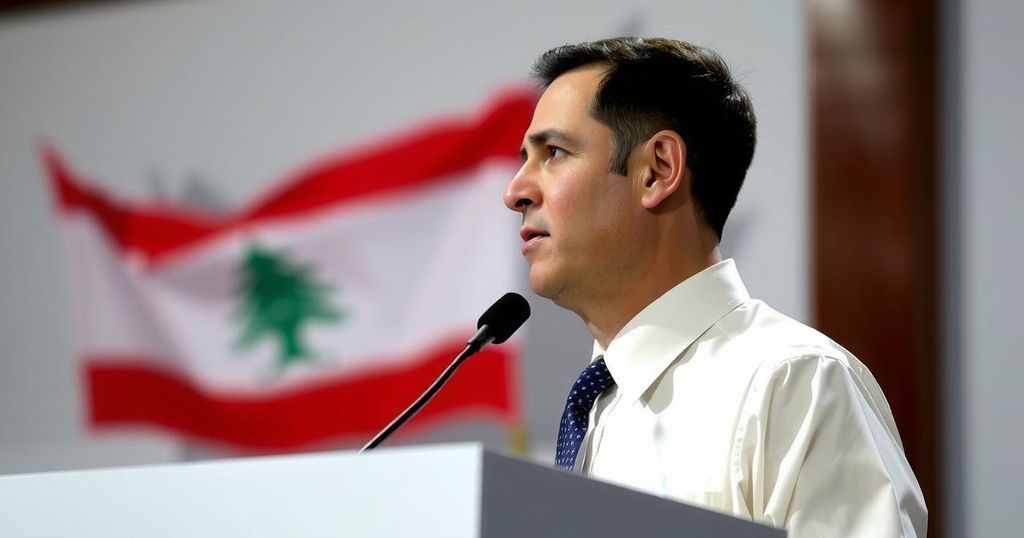Lebanon is set to elect a new president after a prolonged leadership vacuum. The election gains urgency due to recent conflicts and the need for effective governance amid severe economic and humanitarian crises. Joseph Aoun, the army commander-in-chief, emerges as the leading candidate, receiving support amid shifts in political alliances. This election year is crucial for restoring public trust and addressing Lebanon’s multifaceted challenges.
Lebanon is poised to elect a new president following a prolonged absence of effective leadership for over two years. With the election scheduled for Thursday, the need for a competent executive has become paramount, especially in light of the recent ceasefire agreement between Israel and Hezbollah. The ongoing political and economic challenges, exacerbated by internal crises, have made the task daunting for the transitional government under Prime Minister Najib Mikati.
The electoral process has assumed heightened significance amidst Lebanon’s multiple crises, notably a severe economic downturn, frozen bank deposits, and a collapsing currency. The destruction resulting from recent conflict with Israel has compounded these challenges, highlighting the pressing need for restoration and stability. The government has reported that approximately 1.3 million individuals are displaced due to the conflict, necessitating urgent humanitarian efforts to facilitate their return.
Michael Bauer, head of the Beirut office of the Konrad Adenauer Foundation, emphasized the dire state of Lebanese affairs, suggesting that electing a consensus candidate may not suffice. He argued that Lebanon requires a president who can symbolize a genuine new beginning, rather than one rooted in minimal compromises among current political factions.
The imminent election has intensified negotiations among various political parties, which must navigate the complexities of Lebanon’s confessional political system. This system allocates high-ranking political positions based on sectarian lines, necessitating that the president be a Maronite Christian, the prime minister a Sunni Muslim, and the speaker of parliament a Shiite Muslim.
Currently, Joseph Aoun, the commander-in-chief of the Lebanese armed forces, emerges as the frontrunner. Benefiting from apparent bipartisan support, his candidacy has gained traction, notably following a shift in Hezbollah’s stance. Previously aligned with Sleiman Frangieh, Hezbollah appears more amenable to Aoun’s potential presidency, a change attributed to its waning influence during recent conflicts.
Aoun’s value is further enhanced by his leadership of the Lebanese army, which has garnered considerable public trust. According to Bauer, “A ‘President Joseph Aoun’ would be someone who would represent a new, positive force for many Lebanese.” His military background positions him to address emerging security challenges effectively.
As Lebanon approaches the election, political analysts stress the necessity for a functioning and elected government to restore national stability. Ronnie Chatah remarked on the historical significance of electing a president, noting that past extensions of transitional leadership resulted in governance deficits. He stated, “Now, for the first time in two years, there is a possibility that a president will be elected. That is a first positive step.”
Lebanon’s political landscape has been marred by instability, marked by the absence of a cohesive presidential authority for over two years. This vacuum has contributed to a myriad of challenges, including severe economic decline, widespread poverty, and ongoing displacement due to conflict. The country’s complex confessional political system further complicates governance, necessitating a careful balance of power among various religious and ethnic groups. The recent ceasefire agreement between Hezbollah and Israel has underscored the urgent need for effective leadership able to implement long-term peace and stability through credible governance.
In conclusion, Lebanon stands on the precipice of a significant transformation with the forthcoming presidential election. The complexities of its political framework and the pressing need for competent governance demand that the chosen leader embodies unity and progress. Joseph Aoun’s candidacy represents a potential turning point, ushering in the possibility of restoring public trust and addressing the country’s pressing challenges. As Lebanon navigates this crucial juncture, the expectation for a functional government remains paramount for its future stability and recovery.
Original Source: www.dw.com






